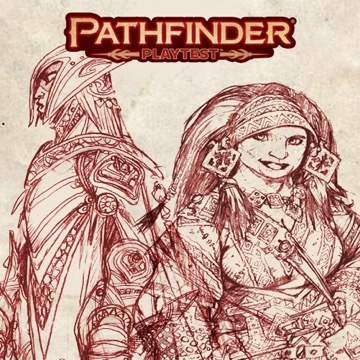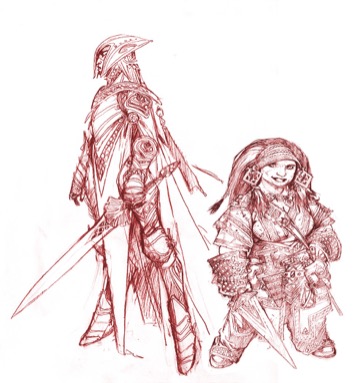While we all live moment-by-moment, we are also shaped by our past. This is especially true for adventurers. After all, very few elves at the ripe age of 14 think to themselves, "Hey, I think I'm going to become a barbarian." There is a path that leads the character to their class. It might synergize obviously with the class's discipline, or at first blush it might seem a non sequitur, but the path is there.
In the Pathfinder Playtest, your ancestry talks a bit about your past, but it also speaks to your present and the promise of the future, by virtue of the fact that you continue to gain ancestry feats through the course of your adventuring career. But to help you dig deeper into your past, you'll choose a background.
Generally, backgrounds allow you to select a bit of backstory that mechanically affects the current state of your character. The first thing it does is grants you a pair of ability boosts (with some limitations on one of those ability boosts), and then it grants a skill feat tied to the theme of your background and proficiency in a Lore skill that also ties into the background. For instance, here is an old chestnut:
Blacksmith (Background)
You were a blacksmith or a blacksmith's apprentice, and during countless hours toiling at the forge, you learned how to smith armor and weapons. Perhaps you worked hard each day and dreamed of adventure each night, or perhaps the adventuring life was thrust upon you by a pivotal event.
Choose two ability boosts. One must be to Strength or Intelligence, and one is a free ability boost.
You gain the Specialty Crafting skill feat for blacksmithing, and you're trained in the Smithing Lore skill.
Sure, it's a bit cliche, but it's a fun cliche. Before becoming a fighter, you were a blacksmith's apprentice. Maybe you crafted your sword or suit of armor and decided to protect home and hearth from monsters. But take a closer look at the background. It's more flexible than that. It's also an excellent background for an alchemist or another character who wants to specialize in crafting. Since you can boost Intelligence via this background, and Intelligence is the key ability score for both Crafting skill and the alchemist class, you can refocus this background into that of an intelligent tinkerer who uses innovation rather than toil to create metal objects. And who knows? Maybe later on in your career, you can fuse your background with other skill feats to invent a new form of alchemical armor or some kind of metal construct.
Not all backgrounds have to do with gainful employment; others deal with the circumstances of your upbringing that you can parlay into useful skills. Here is another example of a classic fantasy trope:
Street Urchin (Background)
You eked out a living by picking pockets on the streets of a major city, never knowing where you'd find your next meal. While some folk adventure for the glory, you adventure as a means of survival.
Choose two ability boosts. One must be to Dexterity or Intelligence, and one is a free ability boost.
You gain the Pickpocket skill feat, and you're trained in the Underworld Lore skill.
While a classic rogue background, this background also has enough flexibility to serve as a perfectly fine background for a wizard or alchemist, and that's only if you dwell on the limited ability boost. Remember, one of the ability boosts if free, so you can play against type and still make a perfectly reasonable character. Imagine a paladin with this background, which isn't so hard if you know anything about a certain iconic paladin...
Not all backgrounds are so all-encompassing, though. After all, your background not only deals with activity but also your personal focus. You may have been an apprentice blacksmith, even for a long while, but retained none of its benefits because you were too busy dreaming about being a Pathfinder.
Pathfinder Hopeful (Background)
You've long wanted to join the adventurous Pathfinder Society, a world-spanning organization of relic hunters. This aspiration has led you to take up the dangerous life of an adventurer eager to make a name for yourself and gain the attention of the Pathfinder Society.
Choose two ability boosts. One must be to Strength or Intelligence, and one is a free ability boost.
You gain the Additional Lore feat, and you're trained in the Pathfinder Society Lore skill.
While the boosts are similar to that of the blacksmith background, the skill selection is, of course, different. I can easily picture this background as that of a young dreamer, toiling away when she must but finding whatever time she can to read various Pathfinder Chronicles (both real and forged) and honing her body and mind for the chance to join the Pathfinder Society.
Incidentally, this is not a background you will find in the Pathfinder Playtest Rulebook. While that weighty tome provides 19 backgrounds, you'll find six more backgrounds in the Pathfinder Playtest Adventure: Doomsday Dawn. Those six are tailor-made for the adventure, granting the opportunity for small, sometimes incidental perks during play for those who take them and allowing you to tailor your character to the story. This is one of the chief benefits of the background system—it can be used to make very general backgrounds or to tailor specific backgrounds to an adventure or a campaign.
And so there you have it; that's the skinny on backgrounds. What kind of backgrounds can you imagine?
Stephen Radney-MacFarland
Senior Designer













